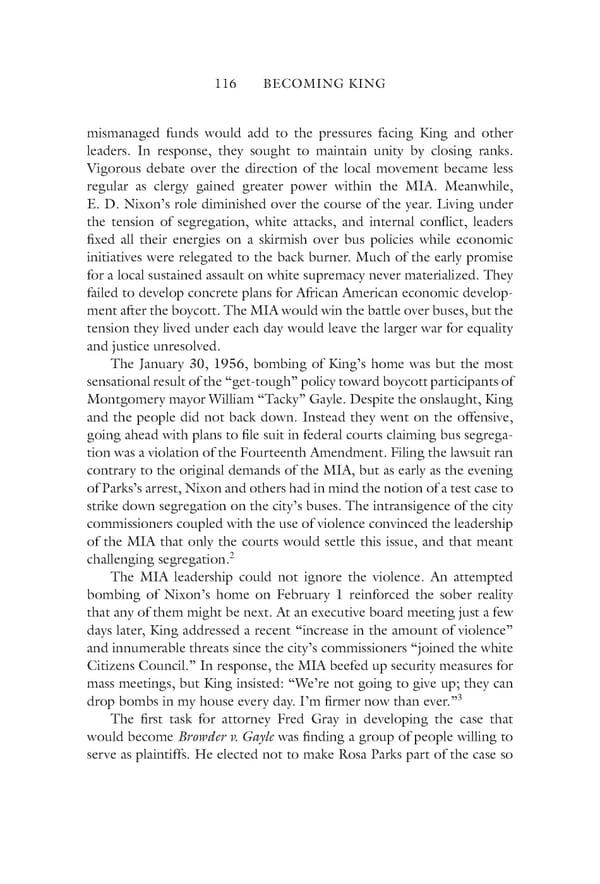116 BECOMING KING mismanaged funds would add to the pressures facing King and other leaders. In response, they sought to maintain unity by closing ranks. Vigorous debate over the direction of the local movement became less regular as clergy gained greater power within the MIA. Meanwhile, E. D. Nixon’s role diminished over the course of the year. Living under the tension of segregation, white attacks, and internal conflict, leaders fixed all their energies on a skirmish over bus policies while economic initiatives were relegated to the back burner. Much of the early promise for a local sustained assault on white supremacy never materialized. They failed to develop concrete plans for African American economic develop- ment after the boycott. The MIA would win the battle over buses, but the tension they lived under each day would leave the larger war for equality and justice unresolved. The January 30, 1956, bombing of King’s home was but the most sensational result of the “get-tough” policy toward boycott participants of Montgomery mayor William “Tacky” Gayle. Despite the onslaught, King and the people did not back down. Instead they went on the offensive, going ahead with plans to file suit in federal courts claiming bus segrega- tion was a violation of the Fourteenth Amendment. Filing the lawsuit ran contrary to the original demands of the MIA, but as early as the evening of Parks’s arrest, Nixon and others had in mind the notion of a test case to strike down segregation on the city’s buses. The intransigence of the city commissioners coupled with the use of violence convinced the leadership of the MIA that only the courts would settle this issue, and that meant challenging segregation.2 The MIA leadership could not ignore the violence. An attempted bombing of Nixon’s home on February 1 reinforced the sober reality that any of them might be next. At an executive board meeting just a few days later, King addressed a recent “increase in the amount of violence” and innumerable threats since the city’s commissioners “joined the white Citizens Council.” In response, the MIA beefed up security measures for mass meetings, but King insisted: “We’re not going to give up; they can 3 drop bombs in my house every day. I’m firmer now than ever.” The first task for attorney Fred Gray in developing the case that would become Browder v. Gayle was finding a group of people willing to serve as plaintiffs. He elected not to make Rosa Parks part of the case so
 Becoming King: Martin Luther King Jr. Page 136 Page 138
Becoming King: Martin Luther King Jr. Page 136 Page 138